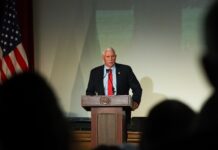“Something that I have learned about in my classes is that there is a toxic stress that comes with being part of any minority group,” Feminist Majority Leadership Alliance (FMLA) President Maggie Calvert said. “But, specifically for LGBTQ+ individuals, it could be constantly having to worry about what others think of you and your identity, questioning if your identity is valid, safety – especially for trans women of color.”
According to the National Alliance on Mental Illness (NAMI), LGBTQ+ individuals are more than twice as likely to experience depression, anxiety, and substance misuse compared to those who identify as straight or cisgender. This is in part due to the societal stigma and discrimination the LGBTQ+ community experiences on a regular basis.
Dr. Kenneth Messina, director of the Student Counseling Center, said these factors align with the findings of the minority stress model, which links the effects of discrimination, prejudice and stigma to psychological stress. He added that this stress can be worsened by lack of acceptance or marginalization within a heteronormative environment or culture.
“When we factor in incidents of bullying and harassment and feelings of being alone or rejected by others we care about,” Messina said, “it makes sense that LGBTQ+ individuals would have a higher likelihood of struggling with mental health issues.”
He commended LGBTQ+ students who have faced such discrimination and prejudice for their strength and resiliency.
“To face these pressures and stresses on top of the pressures of college life and still be able to succeed in a college environment speaks volumes about the resiliency that so many of our students possess,” Messina said.
He and Calvert both believe that living in a predominantly conservative area can cause LGBTQ+ individuals additional stress and negatively affect the entire LGBTQ+ community within the area.
Messina said being in a largely conservative area greatly reduces the number of LGBTQ+ specific services in the community and the number of places in the community where these individuals can feel welcome and safe.
“I think this makes the role of creating and maintaining a safe, open and accepting campus community even more important,” he said.
Calvert said while most students are accepting of others’ identities, she believes that being in a conservative area can cause a lot more stress for students who identify as an LGBTQ+ individual.
“[T]here are constantly preachers in the quad telling us that our sexuality isn’t valid, and God doesn’t love us anymore,” Calvert said.
The LGBTQ+ community often faces discrimination and prejudice; this is due in part to the stereotypes forced on them. In television and film, gay men have often been portrayed as very feminine, while women who identify as lesbian have been portrayed as “butch” and masculine. People who identify as bisexual or pansexual are often thought of as sexually promiscuous or confused about their sexuality. In same-sex relationships, one question seems to arise a lot: “Who is the man/woman in the relationship?” Media has portrayed transgender people as cross-dressers, drag queens or drag kings. These stereotypes can be potentially damaging because they invalidate the experiences and identities of individuals within the LGBTQ+ community.
Calvert identifies as bisexual. She said when she discloses this to potential partners, they often ask for a threesome. She said she feels fetishized, especially by men.
“Guys will always be like, ‘Oh, that’s so hot. How many girls have you been with?’ and prying into my personal information. I don’t have to share that with you, even if I was straight. You wouldn’t ask those questions if I wasn’t into women,” Calvert said.
SRU is generally very accepting of the LGBTQ+ community, with several programs, organizations and resources available to LGBTQ+ identifying students such as the Pride Center and The President’s Commission on Gender Identity & Expression and Sexual Orientation (GIESO).
“I think there is a pretty large acceptance, whether you are gay, straight or bisexual. But, also, I do surround myself with people who are more likely to be accepting,” Calvert said. “But, I do think there is a lot more that we could be doing for trans students as well as non-binary students. I know that we have made some accomplishments with the name change policy. I just think that faculty and students need to be more educated, and we just need to be focusing on that community more specifically.”
Calvert came out on National Coming Out Day in 2018 by posting it on her Instagram. She said that ever since then, she feels that she feels a lot better and more comfortable with herself.
“In the time that I was telling a couple of my friends, when I was kind of out but not really, it was really stressful. I was constantly thinking ‘If I tell this person, are they going to treat me differently? What if someone finds out before I want them to?’” Calvert said. “I am really lucky that my family was really accepting because homelessness is a really big issue with LGBTQ+ youth.”
Though Messina is new to the Student Counseling Center and SRU, he said he feels that the campus is an inviting and supportive community.
“Having just arrived at SRU in August, I’m not sure that I’ve gotten an accurate picture of the overall level of acceptance on campus,” Messina said. “Like any community, I have spoken with individuals that have felt the community at SRU is accepting of them and others that have not felt accepted. However, I have met many people who are supportive allies.”
Messina added that the Student Counseling Center is always looking at how to better serve all students on campus, LGBTQ+ students included, and will continue to look at how to improve outreach efforts and programming specifically for LGBTQ+ students on campus. He also encourages students to reach out to him directly with their input and ideas.
Calvert and Messina encourage all LGBTQ+ students to get involved with organizations on campus that support their community.
“We have several other offices that provide support specifically to the LGBTQ+ community,” Messina said. “The Pride Center and Office for Inclusive Excellence are always excellent resources for students. It’s my hope that [the Student Counseling Center] can collaborate with these and other offices on campus to provide specific supports and programming for LGBTQ+ students at SRU.”
The Pride Center is located in The Suite on the second floor of Smith Student Center and it serves as a safe zone for LGBTQ+ students and a hub for LGBTQ+ resources. The staff at the Pride Center assist in finding guest speakers for classes and information for projects about LGBTQ+ issues. RockOUT is an organization that educates the campus community and support the LGBTQ+ students; it hosts social events and sponsors campus-wide programs.
GIESO works in conjunction with the Pride Center and RockOUT for various events and activities throughout the academic year, such as celebrations of National Coming Out Day in October and National Transgender Day of Remembrance in November.









